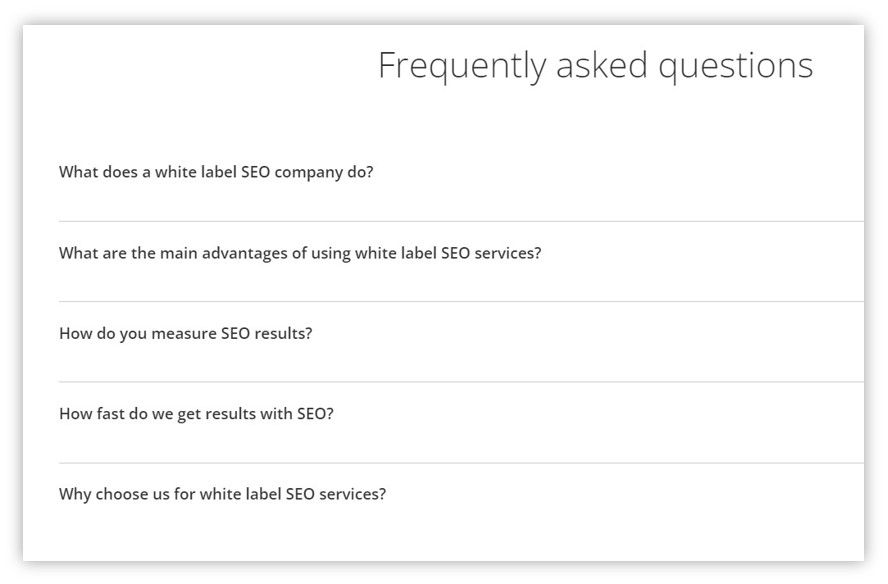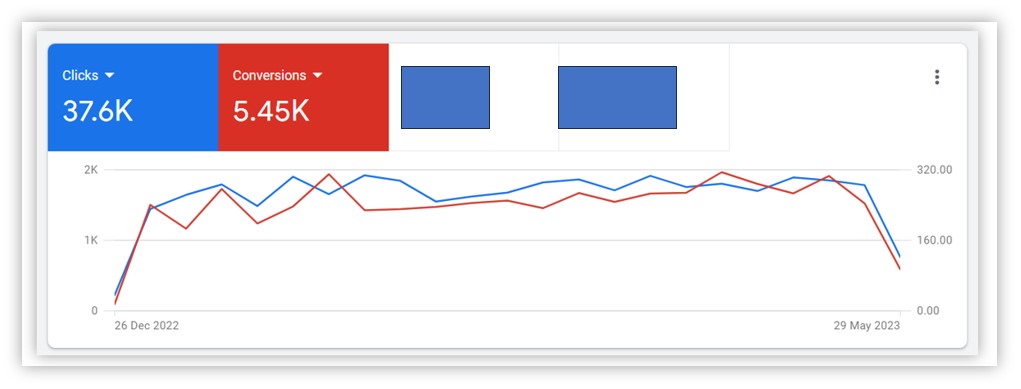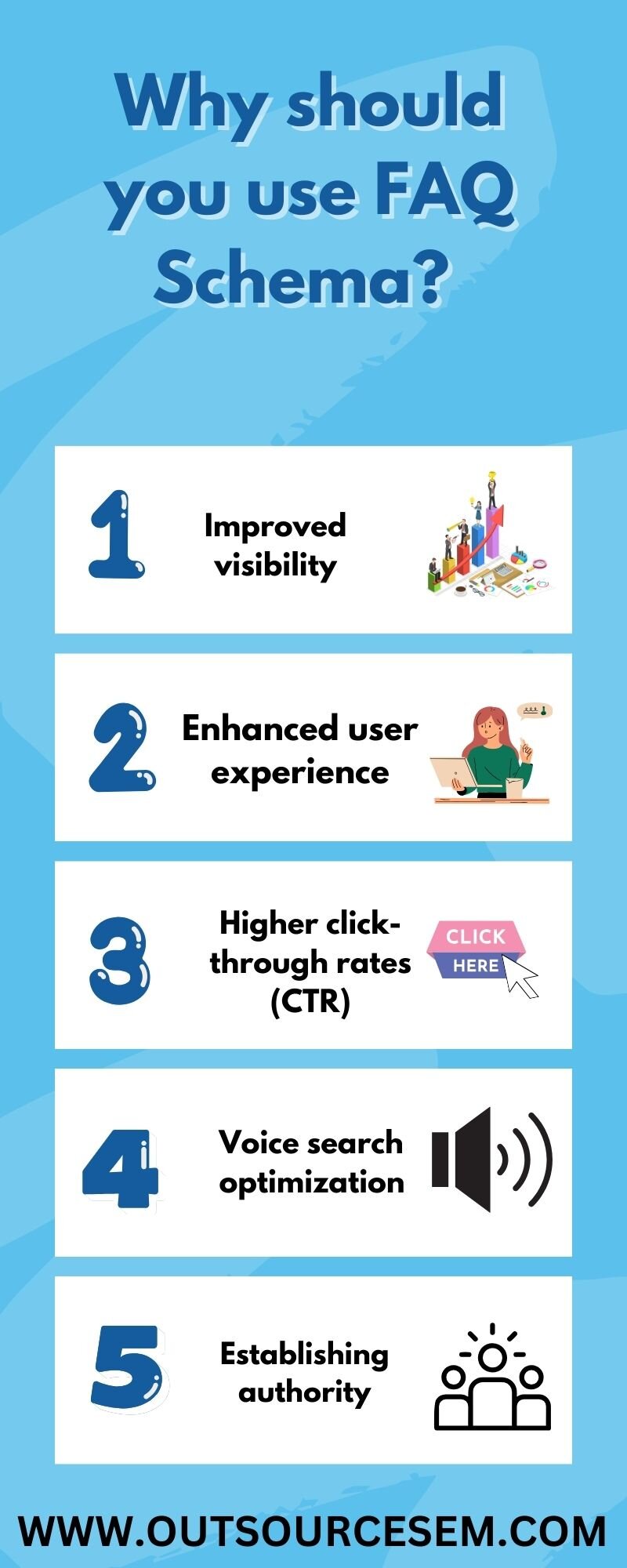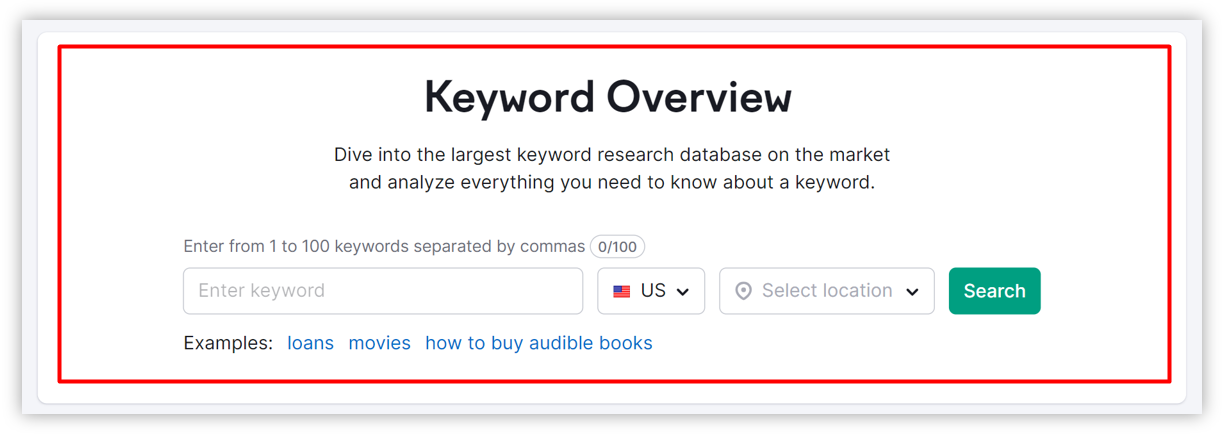In today's competitive digital market, achieving a top website ranking on the SERPs is a primary goal for website owners. Since online marketing is different from traditional marketing, SEO marketers must keep up with the latest digital marketing trends and integrate them into their SEO plan & strategy to achieve their desired marketing goals. You may have come across innovative concepts like structured data and Schema markup, which are popular in online marketing. There are various types of schemas available based on your business goals, such as breadcrumb and organizational schema. Among them, FAQ schema is a popular schema type. By incorporating FAQ schema on your webpage, search engines can easily display your webpage for users' search queries. In this blog, we'll delve into the inner workings of the FAQ schema in detail to understand why it's a strategic necessity to enhance online presence.
What is the FAQ schema?
A powerful approach in the world of structured data markup is FAQ Schema. It enables website owners to give accurate information about frequently asked questions (FAQs) to search engines. You may completely change how search engines understand and present your FAQ information in their results pages by strategically using this markup. Imagine that your FAQs are not only visible but also stand out, grabbing visitors’ attention with clear presentation. The outcome is improved user engagement, higher click-through rates, and a better online experience for your target audience. This structured data markup is more than just a pretty addition. It’s a dynamic technique to increase your website’s impact and online visibility.
When running paid ad campaigns, as you focus on choosing the relevant ad type and ad format to ensure that the potential users click on your PPC ad. You focus on preparing a keyword list and adding the relevant keywords that increase the clicks on your ad. You consider grouping the keywords into the exact match, phrase match and broad match keywords to ensure that your relevant ad appears for the desired user's search query.
Also, in search engine optimization as you focus on choosing the keywords or phrases that match the users' search query so that the chances of the users choosing your website increases. Also, you focus on optimizing the website and work on a plan & strategy to ensure that your website ranks higher for the keywords or search terms entered. In the same way, you need to ensure that you use the relevant keywords in the questions and answers to ensure that the relevant users reach the landing page. You can easily find FAQ schema keywords using the Google Search Console tool, Ahref tool, etc. This would help you have an idea of which phrases to use in the FAQ and then decide which schema to add to the FAQs.

How does the FAQ schema work?
In order to show your FAQs in search results, FAQ Schema gives search engines a standard framework. It essentially serves as a channel of direct interaction with search engines, assisting them in comprehending the context and relevance of your content.
1. Identification of FAQ content: Before utilizing FAQ Schema’s magic, you must identify your frequently asked questions (FAQs), which are the main activity. These frequently asked questions (FAQs) are the questions that people frequently ask about your business, product, or subject. Engage with your audience through surveys, feedback forms, or by examining user searches in the search box on your website to properly identify them. This phase ensures that you’re emphasizing the most relevant and in-demand content by uncovering gems buried deep inside your website. This can also appear in the People Also Ask Box on the search engines.

2. Markup implementation: The transforming process can start when you have identified your FAQs. You include the alluring FAQ Schema markup right into the HTML code that forms the framework of your website. This is not just ordinary code; it’s structured data markup, a complex language that search engines can understand. A well-considered collection of attributes and values are used in this markup. These characteristics completely describe each FAQ entry, including both the query and the thoughtfully crafted response. To ensure that your FAQs stand out in the search engine ballroom, think of this as creating a custom invitation for each of them.
As for your SEO campaigns, you ensure that all your changes, like fixing 3xx & 4xx errors, updating old content, etc., are done correctly so that the performance of SEO campaigns is enhanced. Similarly, for your PPC campaigns, as you focus on choosing the relevant ad groups, writing engaging ad copies, descriptive headlines, etc., so that the performance of PPC ads increases. In the same way, it is essential to ensure that the markup implementation is done properly so that the search engines easily recognize the website content and deliver the desired results.
3. Testing and validation: Your frequently asked questions go through difficult auditions before taking the stage. Utilizing specialized tools like Google’s Structured Data Testing Tool, this calls for thorough testing and validation. Imagine this as the last practice before a big performance. Your FAQs must not only be flawless but also completely adhere to the script. This guarantees that your FAQs operate without any issues when the search engine theater’s curtains lift.
Testing and validation is a crucial strategy to be followed, so that the performance of the FAQ schema enhances. When you perform a proper testing and validation it helps to properly show the relevant results for the users search query.

4. Submission to search engines: It’s time for the big launch of your FAQs now that they have been polished and prepared. You essentially put out the welcome mat for your FAQs by submitting your modified webpage to search engines. This submission makes sure that search engines can find your FAQs and easily understand their content. For writing great content, you can outsource SEO or content specialists. Imagine that you’re doing this by inviting search engines to a glamorous event where your FAQs are the star attraction.
As in email marketing you focus on preparing an email marketing list and driving quality traffic to the landing page, so that the relevant users take the desired action. In the same way, it is essential to focus on submitting desired answers to search engines.
5. Monitoring and maintenance: Your FAQ Schema implementation needs ongoing care and attention, much like a flourishing garden. Your FAQs may need to be adjusted as your website changes and adjusts to the demands of your users, or new ones may appear. It’s crucial to keep a close check on your FAQ Schema and update it frequently to stay up with the expansion of your website. When you do this, your website will continue to be a dependable and dynamic source of information in a constantly changing digital environment, much like adding new chapters to a favorite book.

Why should you use FAQ schema?

A. Improved visibility: FAQ - your unique key to establishing a strong presence in search engine rankings is schema. When your FAQs use schema markup, they frequently appear online as "FAQ snippets." These excerpts display both the query and its brief answer, making them more than simply a dull text listing. This compelling presentation may take up a significant amount of space in search results, holding a prominent spot that's difficult to ignore. Imagine your FAQs taking center stage, glowing brilliantly and grabbing users' attention like a star in the darkness.
For your PPC ad campaign as you focus on increasing the ad visibility and ensuring that the impression share for your paid ads increases. In the same way, you need to focus on increasing the website visibility, and adding FAQ schema would be the best for this.
B. Enhanced user experience: The user experience is king in the digital marketing world. Users are looking for solutions to their inquiries, and they value precision and promptness. You have the resources to do it because of the FAQ Schema. You may improve the customer experience by organizing your FAQs in an easy-to-understand manner. Users can avoid slogging through lengthy paragraphs or complicated explanations in order to acquire the information they want quickly and effectively. It's similar to giving people access to a conveniently located library where information is readily available, resulting in a pleasant and straightforward journey.
C. Higher click-through rates (CTR): FAQ Schema is your hidden weapon in the severe competition for user clicks in the online world. The click-through rates (CTR) of rich results that are embellished with FAQ snippets that include both questions and answers have a history of being higher. Why? Because they provide users with a preview of the content and provide important context and information upfront. Users are enticed by this alluring display, which increases their propensity to click and conduct more research. Imagine doing that before a big-budget movie, it would pique interest and encourage participation.
D. Voice search optimization: Voice search has gained popularity as a common method of information discovery because of the quick development of voice-activated digital assistants like Apple’s Siri, Google’s Alexa, and Google Assistant. When it comes to voice search optimization, FAQ Schema is crucial. To provide accurate and pertinent replies to user questions, these voice assistants frequently rely on structured data. You're simply offering up your FAQs on a silver platter for these voice-driven technologies by deploying FAQ Schema. Your information is well-structured and organized, which makes it simpler for voice assistants to comprehend and provide succinct answers to customer inquiries. It ensures that your website is at the forefront of the voice search revolution by speaking the same language as these voice-powered gateways.
E. Establishing authority: The cornerstone of success in the digital world is trust. Clear and well-organized FAQs do more than simply give information, they also demonstrate your authority and subject-matter knowledge. Users are more inclined to believe in your brand or platform when they can immediately locate trustworthy information on your website. Using FAQ Schema can help you spread information and establish your website as the authoritative source in your field. It's like being the expert tour guide who not only provides information but also inspires travelers' confidence as they navigate the enormous online environment. Users are more inclined to stick with a source they believe in, building loyalty over time.
As in social media marketing you have seen that brands that have an established authority have a higher conversion rate. This helps them engage more users to the website which increases the social media page visibility. It helps in building brand awareness on social media platforms and also engages users into taking the desired action on the landing page. It is also essential to ensure that the domain authority of the website is high and the spam score is lowered. With the help of established authority it helps in peer-to-peer marketing which engages users and drives quality traffic to the webpage.
Tips for implementing FAQ schema
I. Follow guidelines: It's crucial to have a good grasp of Google's structured data principles before stepping into the realm of structured data and Schema markup. These recommendations serve as the game's rules and assist you in making sure your FAQ Schema implementation conforms with search engine requirements. Following these rules helps you prevent any fines or problems in the future while also ensuring that your structured data runs smoothly. It's like creating a solid base for your structured data approach, assuring its endurance and success in the always changing SEO environment.
II. Be concise: In a world that is flooded with information, conciseness is a priceless gift. Focus on making both questions and answers precise, succinct, and specifically pertinent to the requirements of your audience while creating your FAQs for Schema markup. Users want information that is precise and speedy, so stay away from unnecessary details, jargon, or more complicated explanations. Consider it as providing people with a well chosen menu with the information they require without presenting them with too many alternatives. Being short improves user experience and is in line with FAQ schema's emphasis on clarity.
III. Regular updates: The landscape of the digital world is dynamic and constantly changing. Make it a habit to maintain your FAQs current and in line with changes to your business, product, or service as you start your FAQ Schema journey. Inaccurate information might make users angry and damage your credibility. Imagine yourself tending to a well-kept garden, just as you trim and care for your plants, your FAQs require constant upkeep to keep them relevant, up-to-date, and in tune with the changing seasons of your field of expertise.
IV. Use relevant keywords: The vital component of internet discoverability is keywords. In order to improve your search engine rankings, strategically include important keywords to your questions and answers. This is how it goes, users frequently employ particular terms or phrases when doing information searches. Your content is more likely to appear in search results if your FAQs are optimized for certain keywords.You need to ensure that you have unique content and ensure that it creates a sense of urgency among the users to take the desired action. Similar to placing signs along a road, pertinent keywords serve as signs that direct readers to your content. Striking a balance between using keywords naturally and avoiding keyword stuffing, which might lower your ranks, is vital. Consider it as ensuring that your content connects with the questions being asked by your target audience by effortlessly incorporating the terminology they use into your FAQs.

V. Monitor performance: The digital environment is always evolving, and your implementation of the FAQ Schema is no exception. Monitoring your FAQ Schema's performance in search results on a regular basis is similar to giving your website a routine checkup. Pay special attention to important data like click-through rates (CTR), user engagement, and even audience comments. Examine the effectiveness of your FAQs in relation to your aims and objectives. Are they increasing traffic, enhancing user experience, or accomplishing other goals? Be ready to make changes if you see any areas that need to be improved, such as poor CTR or high bounce rates. To keep your FAQs in the limelight, FAQ Schema must be continuously improved. Consider it like navigating a ship, you need to modify your course on a frequent basis to make sure you're making steady progress.
Whether you are running Google Ads, Microsoft Ads, LinkedIn Ads, YouTube Ads, Facebook Ads, etc. the essential point to focus on is monitoring the ad performance continuously. The better the ad ranking & position the higher are the chances of the users taking the desired action. To monitor this performance it is essential to conduct a PPC audit and prepare a PPC report that enhances the performance of crucial PPC metrics. As in search engine optimization, you conduct a SEO audit and prepare an SEO report to analyze the performance of crucial SEO metrics and take the necessary steps to optimize images, boost average page loading time, optimize title tags, meta tags, increase organic traffic, perform backlink analysis, etc. This continuous performance monitoring helps in proper strategic marketing that ultimately helps in achieving desired marketing goals.
Why is FAQ schema important?
FAQ Schema is a strategic tool that may greatly improve your website's exposure, user experience, and authority in the digital age. You can fully utilize FAQ Schema by sticking to the best practices we've discussed in this article, such as obeying the guidelines, remaining concise and clear, using appropriate keywords, and routinely tracking performance. Your frequently asked questions become interesting and educational search results with FAQ Schema, grabbing consumers' attention and increasing click-through rates. It serves as your ticket to success in the voice search era, when structured data is essential for providing consumers with succinct, pertinent responses to their questions.
Conclusion
The better the FAQ rich snippet is optimized the better are the chances of page visibility on the search engine result pages. Using the schema org FAQ tool, you can increase your web page visibility and engage users to take the desired action. The Google FAQ schema helps in knowing the relevant results for the users search query and engages the users to reach the webpage. The FAQ structured data is an essential component that needs to be continuously monitored and engages the users into taking the desired action. The Google FAQ schema is an essential component that needs to be continuously monitored for the most popular search engine - Google. It helps increase the website visibility and engages the users to get their answers for the frequently asked questions. The FAQ markup schema is an essential point to be focused on and it needs to be checked regularly to ensure that the relevant users take the desired action on the landing page.
Furthermore, concise and well-organized FAQs not only offer information but also position your website as a reliable resource for information in your industry. Your audience gains trust as a result of your credibility, which motivates them to interact with your content and return for more. If you find working on FAQ schema a tough task to perform you can get in touch with a digital marketing company and avail of white label SEO services. You can even avail of offshore digital marketing services and hire SEO professionals that have expertise working with video SEO, enterprise SEO, local SEO, small business SEO, detox & penalty removal, SEO keyword research, link building, SEO copywriting, SEO analytics, etc. The SEO experts would help you work with FAQ schema, optimize for FAQ rich snippet, work on schema markup FAQ, FAQ structured data, FAQ page schema,and achieve the desired online marketing goals. By hiring digital marketing experts you can avail various other services for your other industries like roofing SEO, flooring SEO, plumbing SEO, painting SEO, construction SEO and many other services. All these services can increase leads and conversions for your business.
References:
. FAQ schema: A guide for beginners
. FAQ schema: A beginner’s guide – Neil Patel
